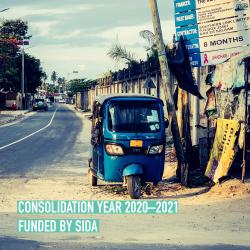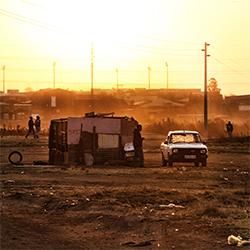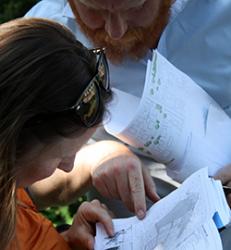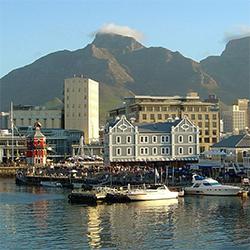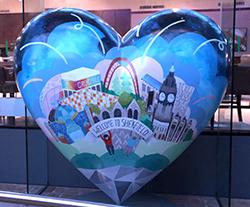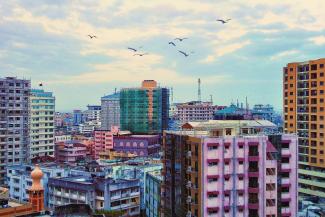
Sharing experience and practical skills in workshops
By Marcela Guerrero Casas
“There was a cartoon I used to watch called Toby Blue and it talked about climate in a language digestible to a child’s mind, which I never forgot. In contrast, I have heard so much from academics on this subject and I don't even remember their names”
This personal reflection, by researcher Edgar Lushaju, one of the participants in the first workshop of the AURI workshop series, was a poignant example of how crucial accessible communication is, particularly given the scope and scale of urbanisation in the African continent. The workshop, which took place on 4 March 2021, convened 40 emerging scholars from various universities that form part of the African Urban Research Initiative (AURI).
AURI, in collaboration with the Mistra Urban Futures programme, kicked off a three-part workshop series which seeks to create an open, supportive and safe space for learning, experience sharing and ultimately to build a strong cohort of scholars across the continent. The Mistra Urban Futures programme, which has concluded this year after 10 years of rich knowledge co-production and experimentation in and between seven cities across the world, provides rich experience that will be unpacked and shared in the workshops.
The first in this series, tackled the challenge of communicating insights from research to diverse audiences and provided some practical examples as well as an in-depth session to develop practical skills. The programme was introduced by Professor Edgar Pieterse, director of the African Centre for Cities who reminded the group that these gatherings to develop a common language and share experiences are crucial to strengthen the presence of the network. Pieterse also pointed to the great responsibility of a new generation of scholars, as being custodians of independence and rigor, speaking truth to power, and ensuring policy processes are evidence based. He concluded there is extraordinary responsibility to make scholarship in the public policy domain accessible through opinion writing, summaries for platforms like the Conversation, as well as writing for the academic community.
This first input in this workshop was presented by Dr Priscila Izar and Mrs Gwamaka Lucas Mwakalinga from the Institute for Human Settlements Studies (IHSS) at Ardhi University in Dar es Salaam who reflected on the experience of communicating to non-academic audiences. Dar es Salaam CityLab is a space for debate on the transformation of the city, and as Izar highlighted “communications is not only a tool for learning and sharing knowledge, it ultimately frames the research”.
The second presentation by Dr Zarina Patel, Environmental and Geographical Science at the University of Cape Town and Amy Davison, the Head of the Climate Change Unit at the City of Cape Town, shed light on how to find common ground to communicate to and with policy makers. The experience of having City officials in the university and academics in the halls of government, spending significant time writing together and finding ways to make the work relevant was transformative at an individual and institutional level, and resulted in academic, policy and popularly accessible outputs.
In response to what constitutes “effective and impactful communications”, presenters seemed to agree that even though traditional metrics such as citations are important, the ultimate expression of success is seeing that research is incorporated into policy and processes that affect people’s lives. Furthermore, the anecdotes shared made it evident that the relationships built through processes of co-production ensure the impact is long lasting and that, as Patel described, the ‘desire lines of influence’ will ultimately ensure that future researchers and policy makers can build on previous work.
The last part of the workshop focused on the practicalities of developing a multiplicity of communication genres. Alma Viviers, Communications Officer from the African Centre for Cities led the group through a variety of processes that ranged from composing a good social media bio to analysing the different audiences relevant to a particular piece of research. This also included important tips when producing videos, blog pieces and policy briefs, to name a few.
The workshop series continues on 11 March and it will focus on the process of knowledge coproduction. In this session, scholars will have the opportunity to hear from colleagues in Lusaka and Kisumu and will also have a chance to delve into the nitty gritty of co-production. Dr Gilbert Siame from the Centre for Urban Research and Planning (CURP) at University of Zambia, will share insights about how to merge diverse knowledge when working with formal and informal actors, particularly as it related to his work on urban markets in Lusaka. Paul Opiyo, Urban Food Security Specialist at Kisumu Local Interaction Platform (KLIP), will highlight the methods used in ensuring genuine participation to co-produce policy briefs as part of the Consuming Urban Poverty (CUP) process in Kisumu, Kenya. The practical session will be guided by Dr Gareth Haysom from the African Centre for Cities.
Marcela Guerrero Casas is the workshop coordinator at African Centre for Cities.
Photo: Dar es Salaam by Rohan Reddy/Unsplash.com

